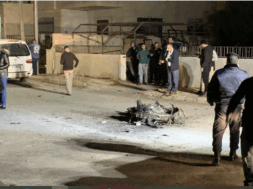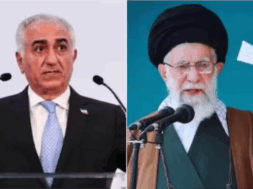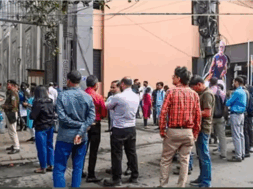
Roving Periscope: Unable to tame protesting women, Iranians ‘poison’ schoolgirls!
Virendra Pandit
New Delhi: Is Iran set to create its own Taliban in an ultra-conservative Shia-majority country, suffering under an “Islamic Revolution” since 1979?
Since September 2022, the regressive Iranian government has been cracking down on thousands of anti-hijab women when, in their first-ever mass protests, they publicly chopped their hair and challenged the prehistoric Ayatollahs’ regime. Even schoolgirls joined this ‘anti-Islamist’ protest.
But few thought the Iranian ultra-extremists could even poison schoolgirls.
According to media reports, they allegedly ‘poisoned’ these schoolgirls to keep them out of school, lest they become a bigger challenge when they grow up.
The poisonings came when the Taliban in neighboring Afghanistan continues to keep schools and universities closed to girls and women, effectively banning them from education.
In recent weeks, a mysterious wave of sickness has gripped schoolgirls in some parts of Iran. Many were hospitalized after they complained of nausea, vomiting, headache, and breathing difficulties. Health officials suspect these schoolgirls might have been deliberately poisoned as some extremists sought the closure of schools.
Mass illness was first reported among the students in the holy city of Qom, south of the capital Tehran. Thereafter, girls from neighboring cities also fell sick. Hundreds of cases of respiratory poisoning were reported among schoolgirls, mainly in Qom.
The latest incident was reported on February 22 from Qom where 15 schoolgirls were hospitalized. They are now stable and under observation. Deputy Governor of Lorestan Majid Monemi said on Sunday that 50 girl students of a high school in Borujerd, western Iran, were poisoned again.
In November, 18 girls were hospitalized in Qom after complaining of nausea, headaches, coughing, breathing difficulties, heart palpitations, and numbness and pain in their hands or legs.
Qom, where the first poisoning was reported is a deeply conservative and religious city that’s home to Iran’s clergy and theological seminaries where most of the country’s leaders and presidents have studied.
Reports of poisoning first emerged from the holy city of Qom. Schools in other cities have also been targeted.
Even Deputy Health Minister Younes Panahi suspected foul play when he told reporters on Sunday that “certain individuals sought the closure of all schools, especially girls’ schools,” the semi-official news agency Fars reported.
“After the poisoning of several students in Qom schools, it was found that some people wanted all schools, especially girls’ schools, to be closed,” Islamic Republic News Agency (IRNA), the state news agency, also quoted Panahi as saying.
After the girls felt ill, dozens were hospitalized for treatment, forcing them to skip school which is what some extremists want.
Local media reported this could be the work of religious zealots who want to prevent girls from attending school.
The schoolgirls’ “poisoning” started in late November, amid unprecedented protests against Iran’s regime over the death of 22-year-old Kurdish-origin woman Mahsa Amini in police custody. She was detained for wearing the hijab “inappropriately”. Later, the authorities responded with force, targeting young girls who participated in the stir, leading to more deaths.
At least 14 schools have been targeted so far across four cities including Tehran, the northwestern city of Ardebil, and the western city of Boroujerd, the media reported.
Since then hundreds of students have taken ill, complaining of similar symptoms in public schools across Iran where students are segregated by gender.
On February 21, Iran’s chief prosecutor, Mohammad Javad Montazeri, said that the incidents could be deliberate. In a letter to the state prosecutor in Qom, he said a “worrying wave of some kind of poisoning” in schools in the city indicates “the possibility of intentional criminal actions.”.
Only one boys’ school has reported instances of poisoning since December.
“It smelled like alcohol, like poison. We left the school, and I started feeling nauseous and I coughed up blood. Since our condition was serious, they sent us to the hospital in an ambulance,” a boy said.
On February 14, angry parents gathered outside the Qom city’s governorate to “demand an explanation.” Videos of protesting parents surfaced on social media in Iran.
Now, fear has gripped families with many girls missing classes. “Of the 250 students in our school, only 50 attended classes,” a Qom teacher said.
Medical experts, who conducted toxicology tests, were unable to find the cause of the sickness. They have not dismissed the possibility that poisonous gas could have caused the illnesses, with some students reporting a strange smell in their classrooms.
Last week, Prosecutor General Mohammad Jafar Montazeri ordered a judicial probe into the incidents.













